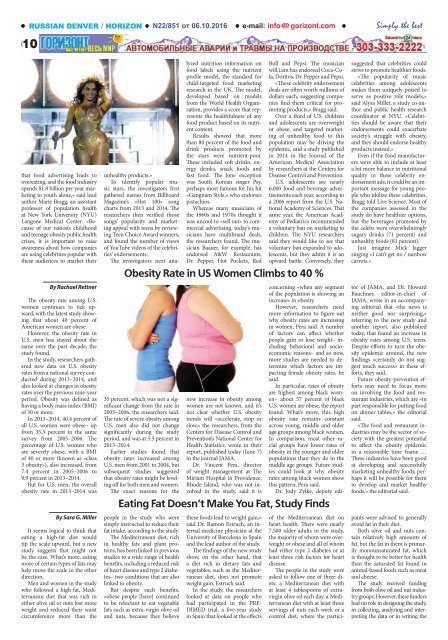Горизонт N22/851
Горизонт (газета) — (Gorizont англ. Horizon ) первая и наиболее влиятельная газета, издающаяся на русском языке в штатеКолорадо, США. Еженедельник, выходит по пятницам, формат Таблоид, 128 цветных и чернобелых страниц, распространяется в городах, составляющих метрополию Денвера (Большой Денвер), и в других населенных пунктах штата Колорадо от графства Саммит до графства Эль—Пасо. Полная электронная версия газеты «Горизонт» доступна в сети Интернет. Подробнее http://en.wikipedia.org/wiki/Gorizont_(newspaper)
Горизонт (газета) — (Gorizont англ. Horizon ) первая и наиболее влиятельная газета, издающаяся на русском языке в штатеКолорадо, США. Еженедельник, выходит по пятницам, формат Таблоид, 128 цветных и чернобелых страниц, распространяется в городах, составляющих метрополию Денвера (Большой Денвер), и в других населенных пунктах штата Колорадо от графства Саммит до графства Эль—Пасо. Полная электронная версия газеты «Горизонт» доступна в сети Интернет. Подробнее http://en.wikipedia.org/wiki/Gorizont_(newspaper)
Create successful ePaper yourself
Turn your PDF publications into a flip-book with our unique Google optimized e-Paper software.
RUSSIAN DENVER / HORIZON<br />
10<br />
<strong>N22</strong>/<strong>851</strong> от 06.10.2016 e-mail: info@gorizont.com Simply the best<br />
y<br />
that food advertising leads to<br />
overeating, and the food industry<br />
spends $1.8 billion per year marketing<br />
to youth alone,» said lead<br />
author Marie Bragg, an assistant<br />
professor of population health<br />
at New York University (NYU)<br />
Langone Medical Center. «Because<br />
of our nation’s childhood<br />
and teenage obesity public health<br />
crises, it is important to raise<br />
awareness about how companies<br />
are using celebrities popular with<br />
these audiences to market their<br />
By Rachael Rettner<br />
The obesity rate among U.S.<br />
women continues to tick upward,<br />
with the latest study showing<br />
that about 40 percent of<br />
American women are obese.<br />
However, the obesity rate in<br />
U.S. men has stayed about the<br />
wsame over the past decade, the<br />
study found.<br />
In the study, researchers gathered<br />
new data on U.S. obesity<br />
rates from a national survey conducted<br />
during 2013–2014, and<br />
also looked at changes in obesity<br />
rates over the previous nine-year<br />
period. Obesity was defined as<br />
having a body mass index (BMI)<br />
of 30 or more.<br />
In 2013–2014, 40.4 percent of<br />
all U.S. women were obese– up<br />
from 35.3 percent in the same<br />
survey from 2005–2006. The<br />
percentage of U.S. women who<br />
are severely obese, with a BMI<br />
of 40 or more (known as «class<br />
3 obesity»), also increased, from<br />
7.4 percent in 2005–2006 to<br />
f9.9 percent in 2013–2014.<br />
But for U.S. men, the overall<br />
obesity rate in 2013–2014 was<br />
f<br />
By Sara G. Miller<br />
It seems logical to think that<br />
eating a high-fat diet would<br />
tip the scale upward, but a new<br />
study suggests that might not<br />
be the case. What’s more, eating<br />
more of certain types of fats may<br />
help move the scale in the other<br />
direction.<br />
Men and women in the study<br />
who followed a high-fat, Mediterranean<br />
diet that was rich in<br />
either olive oil or nuts lost more<br />
weight and reduced their waist<br />
circumference more than the<br />
unhealthy products.»<br />
To identify popular music<br />
stars, the investigators first<br />
gathered names from Billboard<br />
Magazine’s «Hot 100» song<br />
charts from 2013 and 2014. The<br />
researchers then verified those<br />
songs’ popularity and marketing<br />
appeal with teens by reviewing<br />
Teen Choice Award winners,<br />
and found the number of views<br />
of YouTube videos of the celebrities’<br />
endorsements.<br />
The investigators next analyzed<br />
nutrition information on<br />
food labels using the nutrient<br />
profile model, the standard for<br />
child-targeted food marketing<br />
research in the UK. The model,<br />
developed based on models<br />
from the World Health Organization,<br />
provides a score that represents<br />
the healthfulness of any<br />
food product based on its nutrient<br />
content.<br />
Results showed that more<br />
than 80 percent of the food and<br />
drink products promoted by<br />
the stars were nutrient-poor.<br />
These included soft drinks, energy<br />
drinks, snack foods and<br />
fast food. The lone exception<br />
was South Korean singer Psy,<br />
perhaps most famous for his hit<br />
«Gangnam Style,» who endorses<br />
pistachios.<br />
Whereas many musicians of<br />
the 1960s and 1970s thought it<br />
was uncool to «sell out» to commercial<br />
advertising, today’s musicians<br />
have multibrand deals,<br />
the researchers found. The musician<br />
Baauer, for example, has<br />
endorsed A&W Restaurants,<br />
Dr. Pepper, Hot Pockets, Red<br />
Bull and Pepsi. The musician<br />
will.i.am has endorsed Coca-Cola,<br />
Doritos, Dr. Pepper and Pepsi.<br />
«These celebrity endorsement<br />
deals are often worth millions of<br />
dollars each, suggesting companies<br />
find them critical for promoting<br />
products,» Bragg said.<br />
Over a third of U.S. children<br />
and adolescents are overweight<br />
or obese, and targeted marketing<br />
of unhealthy food to this<br />
population may be driving the<br />
epidemic, said a study published<br />
in 2014 in the Journal of the<br />
American Medical Association<br />
by researchers at the Centers for<br />
Disease Control and Prevention.<br />
U.S. adolescents see nearly<br />
6,000 food and beverage advertisements<br />
each year, according to<br />
a 2006 report from the U.S. National<br />
Academy of Sciences. That<br />
same year, the American Academy<br />
of Pediatrics recommended<br />
a voluntary ban on marketing to<br />
children. The NYU researchers<br />
said they would like to see that<br />
voluntary ban expanded to adolescents,<br />
but they admit it is an<br />
upward battle. Conversely, they<br />
Obesity Rate in US Women Climbs to 40 %<br />
35 percent, which was not a significant<br />
change from the rate in<br />
2005–2006, the researchers said.<br />
The rate of severe obesity among<br />
U.S. men also did not change<br />
significantly during the study<br />
period, and was at 5.5 percent in<br />
2013–2014.<br />
Earlier studies found that<br />
obesity rates increased among<br />
U.S. men from 2001 to 2004, but<br />
subsequent studies suggested<br />
that obesity rates might be leveling<br />
off for both men and women.<br />
The exact reasons for the<br />
new increase in obesity among<br />
women are not known, and it’s<br />
not clear whether U.S. obesity<br />
trends will «accelerate, stop or<br />
slow,» the researchers, from the<br />
Centers for Disease Control and<br />
Prevention’s National Center for<br />
Health Statistics, wrote in their<br />
report, published today (June 7)<br />
in the journal JAMA.<br />
Dr. Vincent Pera, director<br />
of weight management at The<br />
Miriam Hospital in Providence,<br />
Rhode Island, who was not involved<br />
in the study, said it is<br />
Eating Fat Doesn’t Make You Fat, Study Finds<br />
people in the study who were<br />
simply instructed to reduce their<br />
fat intake, according to the study.<br />
The Mediterranean diet, rich<br />
in healthy fats and plant proteins,<br />
has been linked in previous<br />
studies to a wide range of health<br />
benefits, including a reduced risk<br />
of heart disease and type 2 diabetes–<br />
two conditions that are also<br />
linked to obesity.<br />
But despite such benefits,<br />
«obese people [have] continued<br />
to be reluctant to eat vegetable<br />
fats such as extra-virgin olive oil<br />
and nuts, because they believe<br />
these foods lead to weight gain,»<br />
said Dr. Ramon Estruch, an internal<br />
medicine physician at the<br />
University of Barcelona in Spain<br />
and the lead author of the study.<br />
The findings of the new study<br />
show, on the other hand, that<br />
a diet rich in dietary fats and<br />
vegetables, such as the Mediterranean<br />
diet, does not promote<br />
weight gain, Estruch said.<br />
In the study, the researchers<br />
looked at data on people who<br />
had participated in the PRE-<br />
DIMED trial, a five-year study<br />
in Spain that looked at the effects<br />
suggested that celebrities could<br />
strive to promote healthier foods.<br />
«The popularity of music<br />
celebrities among adolescents<br />
makes them uniquely poised to<br />
serve as positive role models,»<br />
said Alysa Miller, a study co-author<br />
and public health research<br />
coordinator at NYU. «Celebrities<br />
should be aware that their<br />
endorsements could exacerbate<br />
society’s struggle with obesity,<br />
and they should endorse healthy<br />
products instead.»<br />
Even if the food manufacturers<br />
were able to include at least<br />
a bit more balance in nutritional<br />
quality in these celebrity endorsement<br />
ads, it could be an important<br />
message for young people<br />
who idolize these celebrities,<br />
Bragg told Live Science. Most of<br />
the companies assessed in the<br />
study do have healthier options,<br />
but the beverages promoted by<br />
the celebs were overwhelmingly<br />
sugary drinks (71 percent) and<br />
unhealthy foods (81 percent).<br />
Just imagine Mick Jagger<br />
singing «I can’t get no / rainbow<br />
carrots.»<br />
concerning «when any segment<br />
of the population is showing an<br />
increase» in obesity.<br />
However, researchers need<br />
more information to figure out<br />
why obesity rates are increasing<br />
in women, Pera said. A number<br />
of factors can affect whether<br />
people gain or lose weight– including<br />
behavioral and socioeconomic<br />
reasons– and so now,<br />
more studies are needed to determine<br />
which factors are impacting<br />
female obesity rates, he<br />
said.<br />
In particular, rates of obesity<br />
are highest among black women–<br />
about 57 percent of black<br />
U.S. women are obese, the report<br />
found. What’s more, this high<br />
obesity rate remains constant<br />
across young, middle and older<br />
age groups among black women.<br />
In comparison, most other racial<br />
groups have lower rates of<br />
obesity in the younger and older<br />
populations than they do in the<br />
middle age groups. Future studies<br />
could look at why obesity<br />
rates among black women show<br />
this pattern, Pera said.<br />
Dr. Jody Zylke, deputy editor<br />
of JAMA, and Dr. Howard<br />
Bauchner, editor-in-chief of<br />
JAMA, wrote in an accompanying<br />
editorial that «the news is<br />
neither good nor surprising,»<br />
referring to the new study and<br />
another report, also published<br />
today, that found an increase in<br />
obesity rates among U.S. teens.<br />
Despite efforts to turn the obesity<br />
epidemic around, the new<br />
findings «certainly do not suggest<br />
much success» in these efforts,<br />
they said.<br />
Future obesity-prevention efforts<br />
may need to focus more<br />
on involving the food and restaurant<br />
industries, which are «in<br />
part responsible for putting food<br />
on dinner tables,» the editorial<br />
said.<br />
«The food and restaurant industries<br />
may be the sector of society<br />
with the greatest potential<br />
to affect the obesity epidemic<br />
in a reasonable time frame …<br />
These industries have been good<br />
at developing and successfully<br />
marketing unhealthy foods; perhaps<br />
it will be possible for them<br />
to develop and market healthy<br />
foods,» the editorial said.<br />
of the Mediterranean diet on<br />
heart health. There were nearly<br />
7,500 older adults in the study,<br />
the majority of whom were overweight<br />
or obese and all of whom<br />
had either type 2 diabetes or at<br />
least three risk factors for heart<br />
disease.<br />
The people in the study were<br />
asked to follow one of three diets:<br />
a Mediterranean diet with<br />
at least 4 tablespoons of extravirgin<br />
olive oil each day, a Mediterranean<br />
diet with at least three<br />
servings of nuts each week or a<br />
control diet, where the participants<br />
were advised to generally<br />
avoid fat in their diet.<br />
Both olive oil and nuts contain<br />
relatively high amounts of<br />
fat, but the fat in them is primarily<br />
monounsaturated fat, which<br />
is thought to be better for health<br />
than the saturated fat found in<br />
animal-based foods such as meat<br />
and cheese.<br />
The study received funding<br />
from both olive oil and nut industry<br />
groups. However, these funders<br />
had no role in designing the study,<br />
in collecting, analyzing and interpreting<br />
the data or in writing the
















